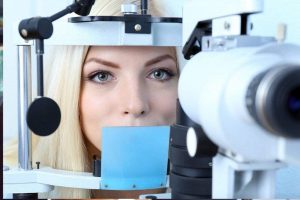Dry eyes affect the quality of life for up to 30 percent of adults over the age of 50.
Dry eye syndrome (DES) is a common condition that results from insufficient tear quantity or inadequate tear quality.
Our tears are responsible for lubricating our eyes and keeping them moist and nourished. Healthy tears consist of three elements: oil, mucus, and water.
A problem within any of these essential elements can cause an imbalance within the tear film and affect tear production— consequently leading to DES.
Symptoms of DES:
- Red eyes
- Burning in the eyes
- Itchy eyes
- Excessive tearing/watery eyes
- Blurry vision
- Sensitive or sore eyes
- Eyelid inflammation and discomfort
- Foreign body sensation in the eyes
If you suspect you have dry eyes, contact an eye doctor near you, who can diagnose and treat the condition.
SEE RELATED: Dry Eye and Menopause
How does aging lead to DES?
Lacrimal gland function
As we age, the amount of tears produced by the lacrimal gland naturally reduces.
This can lead to insufficient water (aqueous) production, and significantly affect the eye’s ability to maintain moisture.
Medications
Many adults over the age of 50 begin to take medications for conditions that are more prevalent among the older population, such as hypertension, diabetes, rheumatoid arthritis, and Parkinson’s disease.
Many times, these conditions or the medications prescribed to manage these conditions contain side effects that include dry eye, or increase your risk of developing DES.
Menopause
Menopause is a common cause of DES in women above the age of 50.
Approximately 61 percent of perimenopausal and menopausal women are affected by DES.
Furthermore, around 38 percent of post-menopausal women in the U.S. use hormone replacement therapy (HRT) to manage their menopausal symptoms— a treatment that has been closely linked to DES.
Meibomian gland degeneration
The meibomian glands in the eyelids produce the essential oil and lipids required to lower the evaporation rate of the tears.
As we age, these glands become blocked more easily, and can even begin to degenerate. This can lead to reduced or inadequate oil production and meibomian gland dysfunction (MGD).
The most common type of MGD is called obstructive MGD. This occurs when the meibomian glands become blocked or clogged by thick secretions. Obstructive MGD prevents the oil from reaching the eye’s surface and results in quicker tear evaporation.
What can you do to alleviate dry eyes?
If you are experiencing symptoms of DES, schedule an appointment for an eye exam.
Over-the-counter (OCT) remedies, such as artificial tears eye drops, gels and ointments can provide relief for mild to moderate symptoms. Though, if your symptoms are more severe or persistent, there is a wide variety of effective dry eye treatments that can significantly reduce or eliminate your symptoms.
Hydrate throughout the day, ensuring that you drink at least 8 cups of water per day. Not only will increasing your water intake help you to maintain your overall health, it will also help your eyes stay moist and reduce dry eye symptoms.
Humidifiers can be placed around your home to increase the humidity and moisture in your environment. This is not only beneficial for your skin and respiratory system, but to your eyes as well.
Reduce screen time or at least take frequent breaks from your digital device throughout the day. Using the computer and watching television has been linked to reduced blinking, which can cause your eyes to feel dry and irritated and lead to other dry eye symptoms.
LEARN MORE: Guide to Eye Conditions
Speak to an eye doctor if your symptoms persist or worsen. Your doctor will examine your eyes to determine which dry eye treatments will be most effective for you.
The natural aging process can lead to a range of ocular problems, affecting both the quantity and quality of your tears and causing the uncomfortable dry eye symptoms you may be experiencing.
Don’t let dry eyes keep you from enjoying your golden years.
With an effective treatment plan, you can increase your comfort and improve your vision to enjoy the activities you love most.










